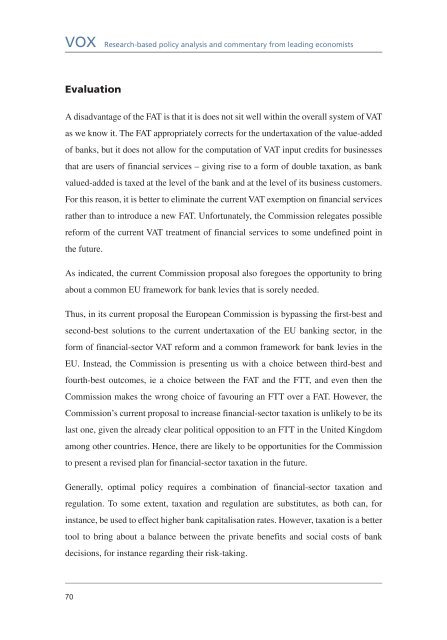You also want an ePaper? Increase the reach of your titles
YUMPU automatically turns print PDFs into web optimized ePapers that Google loves.
VOX Research-based policy analysis and commentary from leading economists<br />
Evaluation<br />
A disadvantage of the FAT is that it is does not sit well within the overall system of VAT<br />
as we know it. The FAT appropriately corrects for the undertaxation of the value-added<br />
of banks, but it does not allow for the computation of VAT input credits for businesses<br />
that are users of financial services – giving rise to a form of double taxation, as bank<br />
valued-added is taxed at the level of the bank and at the level of its business customers.<br />
For this reason, it is better to eliminate the current VAT exemption on financial services<br />
rather than to introduce a new FAT. Unfortunately, the Commission relegates possible<br />
reform of the current VAT treatment of financial services to some undefined point in<br />
the future.<br />
As indicated, the current Commission proposal also foregoes the opportunity to bring<br />
about a common EU framework for bank levies that is sorely needed.<br />
Thus, in its current proposal the European Commission is <strong>by</strong>passing the first-best and<br />
second-best solutions to the current undertaxation of the EU banking sector, in the<br />
form of financial-sector VAT reform and a common framework for bank levies in the<br />
EU. Instead, the Commission is presenting us with a choice between third-best and<br />
fourth-best outcomes, ie a choice between the FAT and the FTT, and even then the<br />
Commission makes the wrong choice of favouring an FTT over a FAT. However, the<br />
Commission’s current proposal to increase financial-sector taxation is unlikely to be its<br />
last one, given the already clear political opposition to an FTT in the United Kingdom<br />
among other countries. Hence, there are likely to be opportunities for the Commission<br />
to present a revised plan for financial-sector taxation in the future.<br />
Generally, optimal policy requires a combination of financial-sector taxation and<br />
regulation. To some extent, taxation and regulation are substitutes, as both can, for<br />
instance, be used to effect higher bank capitalisation rates. However, taxation is a better<br />
tool to bring about a balance between the private benefits and social costs of bank<br />
decisions, for instance regarding their risk-taking.<br />
70














